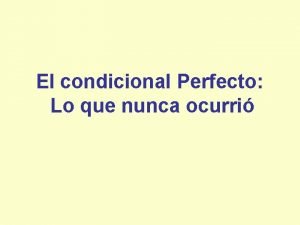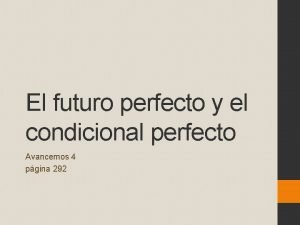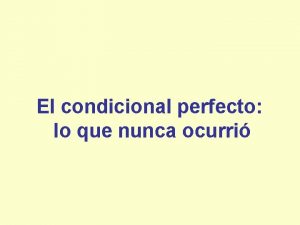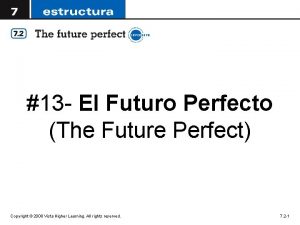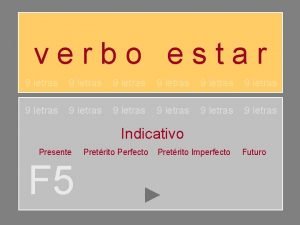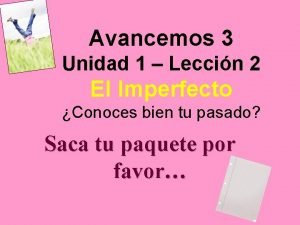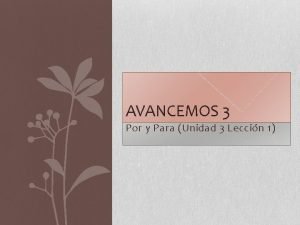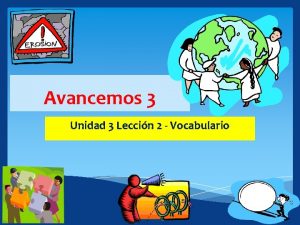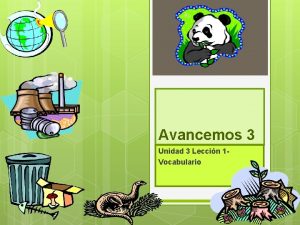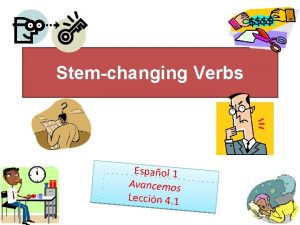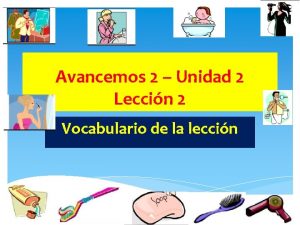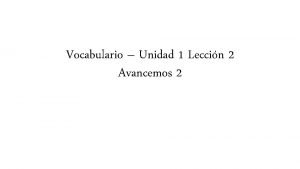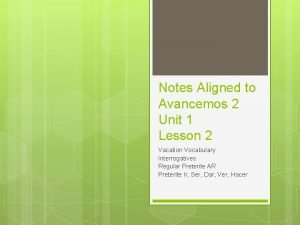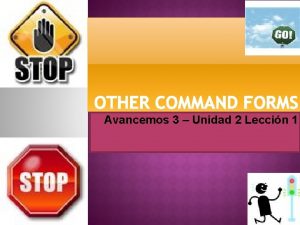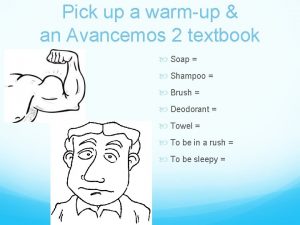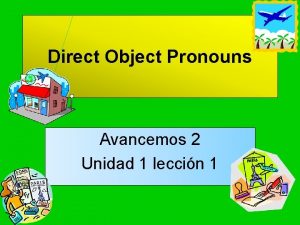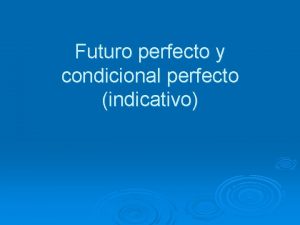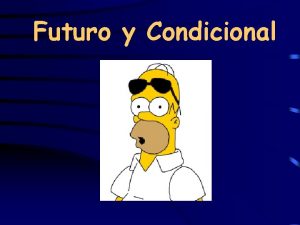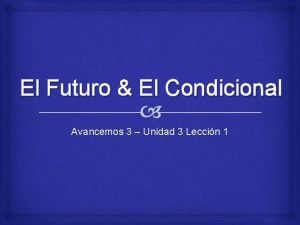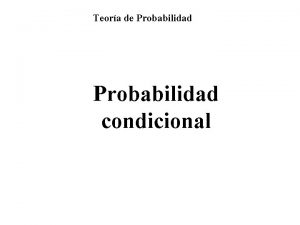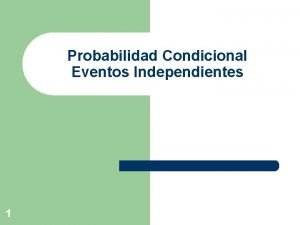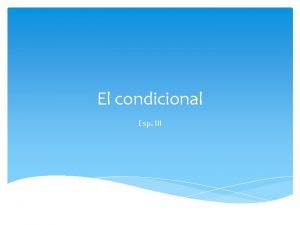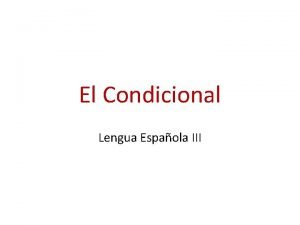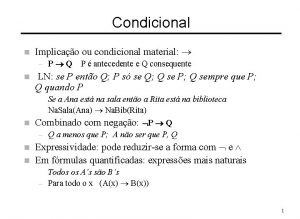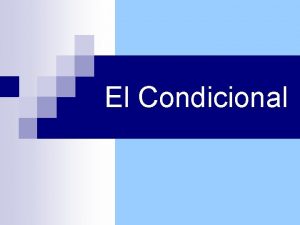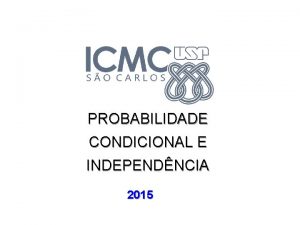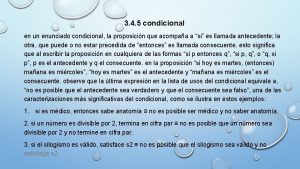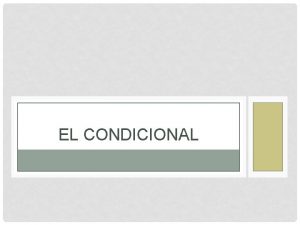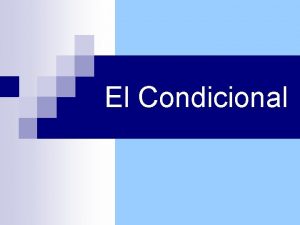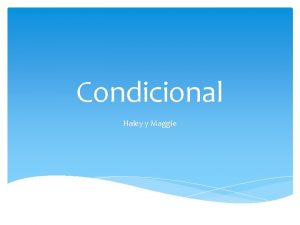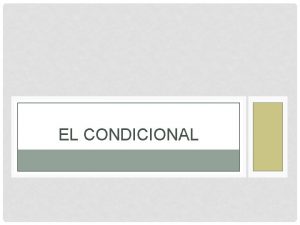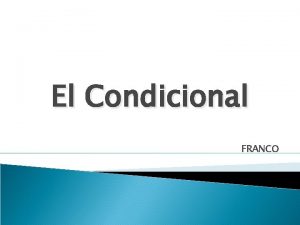El futuro perfecto y el condicional perfecto Avancemos
























- Slides: 24

El futuro perfecto y el condicional perfecto Avancemos 4 página 292

Perfect Tenses • Remember that perfect tenses use the verb HABER along with the past participle. • So far you’ve already learned the: • Present Perfect • Past Perfect or Pluperfect • Present Perfect Subjunctive

Present Perfect (Préterito Perfecto) • He • Has • Ha Hemos Habéis Han (Present of HABER) • Yo he vivido en Rochester por 16 años. • I have lived in Rochester for 16 years.

Pluperfect (Pluscuamperfecto) • Habías Habíamos Habíais (imperfect of HABER) • Habían • Cuando llegué a casa, mi familia ya había comido la cena. • When I arrived home, my family had already eaten dinner.

Present Perfect Subjunctive El subjuntivo del pretérito pasado Remember, use this: 1. if you need subjunctive! 2. When the trigger is in the present and the subjunctive already happened. hayas hayamos hayáis (present subjunctive) hayan

Ejemplo: • Me alegro que tú (present tense - now) hayas sido aceptado (already happened) a la universidad.

¡Participios irregulares!

romper roto cubrir cubierto escribir escrito poner puesto ver visto hacer hecho volver vuelto decir dicho morir muerto devolver devuelto abrir abierto

Future Perfect: El futuro Perfecto Use the future perfect tense to express what will have happened by a certain time.

A formar… Use the future of the verb haber with the past participle.

Ejemplo - inventar habré inventado habrás inventado habrá inventado habremos inventado habréis inventado habrán inventado

The Future Perfect The future perfect tense is often used with: dentro de + time – in/within (time frame)… para – by a certain time

Dentro de cinco años, nos habremos graduado de la universidad. In five years, we will have graduated from college.

Para el fin de mayo yo habré tomado todos mis exámenes finales. By the end of May I will have taken all of my final exams.

The Future Perfect You also use the future perfect tense to speculate (make a guess) about something that may have happened in the past.

The Future Perfect Laura no me llamó. ¿Qué le habrá pasado? Habrá perdido el teléfono. Laura didn’t call me. What could have happened to her? Perhaps she lost her phone.

El condicional Perfecto: The conditional Perfect • The conditional perfect is used to express what WOULD HAVE HAPPENED, but did not. • Think of it as the “excuse” tense!

A formar… Use the conditional of the verb haber with the past participle.

Ejemplo: Llamar Habría llamado Habríamos llamado Habríais llamado Habrían llamado

Ejemplos El habría trabajado, pero estaba cansado. He would have worked, but he was tired.

Ejemplos - más El habría trabajado si no estuviera cansado. He would have worked if he wasn’t tired.

IMPORTANTE: when making your “excuse”… If you use but (pero) then the following verb will be in the INDICATIVE (present, preterite, or imperfect, etc). If you use if (si) the verb will be in the IMPERFECT SUBJUNCTIVE

Yo habría comido pero no tenía hambre. I would have eaten but I wasn’t hungry.

Yo habría comido si tuviera hambre. I would have eaten if I were hungry.
 El condicional perfecto
El condicional perfecto El condicional perfecto
El condicional perfecto Condicional perfecto
Condicional perfecto Pluscuamperfecto del subjuntivo y condicional perfecto
Pluscuamperfecto del subjuntivo y condicional perfecto Pretérito pluscuamperfecto
Pretérito pluscuamperfecto Indica la forma apropiada del futuro perfecto.
Indica la forma apropiada del futuro perfecto. Estuve estuviste
Estuve estuviste Soy un ser imperfecto
Soy un ser imperfecto Unidad 5 leccion 2 vocabulario a
Unidad 5 leccion 2 vocabulario a Avancemos 3 unidad 1 leccion 2
Avancemos 3 unidad 1 leccion 2 Avancemos 3 unidad 3 leccion 1
Avancemos 3 unidad 3 leccion 1 Repaso de vocabulario lección 1
Repaso de vocabulario lección 1 Avancemos 3 unidad 3 leccion 2
Avancemos 3 unidad 3 leccion 2 Avancemos 3 unidad 3 leccion 1
Avancemos 3 unidad 3 leccion 1 Avancemos
Avancemos Avancemos 2 unidad 2 leccion 2
Avancemos 2 unidad 2 leccion 2 Avancemos 2 unidad 2 leccion 1
Avancemos 2 unidad 2 leccion 1 Avancemos 2 unidad 1 leccion 2
Avancemos 2 unidad 1 leccion 2 Simple present progressive tense
Simple present progressive tense Avancemos 3 unidad 1 leccion 1 vocabulario a
Avancemos 3 unidad 1 leccion 1 vocabulario a Avancemos 1 unidad 2 leccion 1
Avancemos 1 unidad 2 leccion 1 A nosotros 1 of 1 (gustar) ir de excursión y acampar.
A nosotros 1 of 1 (gustar) ir de excursión y acampar. Unidad 2 leccion 1 avancemos 3
Unidad 2 leccion 1 avancemos 3 Avancemos 2 textbook
Avancemos 2 textbook Avancemos 2 direct object pronouns
Avancemos 2 direct object pronouns
